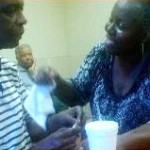
Volunteers – both with and without Alzheimer's disease – are needed to participate in actively enrolling clinical trials about Alzheimer's and related dementias. Recruiting and retaining trial participants is one of the greatest obstacles to developing the next generation of treatments and possibly future cures for Alzheimer's and other dementias.
TrialMatch® is a free matching service that connects individuals with Alzheimer's and other dementias, caregivers, healthy volunteers and physicians with current clinical studies. With a database of 130+ Alzheimer's clinical trials, including both pharmacological (drug) and non-pharmacological (non-drug) studies being conducted across the country, TrialMatch is a unique opportunity to make a difference in your life and the life of others with Alzheimer’s disease.
The Alzheimer’s Association spoke with TrialMatch user Wanda Young regarding the benefits of her participation in these clinical studies. Wanda is caregiver for her husband, mother and brother, all of which have forms of dementia. She is participating in clinical trials as a healthy volunteer.
Wanda initially called the Alzheimer’s Association to receive information about brain donation and was told about TrialMatch. “I

was interested in the opportunity because I wanted to learn; I’m always trying to learn more. I’m actually taking a psychology course right now, studying the brain. My kids think I’m a bit of a geek, always trying to absorb the most I can about a subject
... Education is the key to everything.”
"TrialMatch allowed me to plan my days as a caregiver better. It helped me take a look at myself and how I was coping, and how I could better care for my loved ones. TrialMatch prepared me for what to expect and how to respond as my family members progress with their various dementias. The TrialMatch experiences allow me to think further beyond today and into the future.”
Wanda says that she saw the TrialMatch process not only as an outlet, but as a helpful planning tool that allowed her to plan major life decisions. “My time at the computer is my time alone and my time away from everything else I am experiencing. Using the computer on my own schedule is an easy way to receive new information. The studies I participated in helped me write my advance directive and allowed me to look at my own life and health. I also received tips for managing the medications of my family members, as well as helpful information about daily toiletry, tactful ways to redirect, travel to doctor appointments and so many helpful resources for each of them (my husband, mother and now my brother.) These are not easy tasks. They take time to complete, and only someone in my situation knows what it is like.”
Whether you are a caregiver, someone with Alzheimer’s or other form of dementia, or even a loved one of a caregiver or person with dementia, you are needed for future research. “I wish more physicians knew about TrialMatch and could tell their patients and their families about it. I used to have my own business; needless to say, my life is very different from what it used to be. Caregiving takes a major hit on your self-esteem. As a caregiver, I have gained a lot of weight due to the stressors in my life. Without a support group or outside help, you can begin to feel like a non-entity, like you don’t exist. Thankfully I have been able to join a support group and have participated in groups at the Alzheimer’s Association to help with these feelings.”
Wanda recognizes that the more that she learns, the more she can change her life and the lives of others. TrialMatch educates caregivers and offers researchers valuable information only caregivers and those with Alzheimer’s and other dementias can provide. “I believe I have become an advocate,” Wanda says. “I read, I experience, I learn, and I take what I know back to the nursing home to help those in need. I share what I have learned with the staff, other caregivers, the residents and their family members. You don’t feel so far-removed from researchers when you are able to participate in a trial.
I felt as though someone heard me, and that in itself is empowering.
TrialMatch has been a way to de-stress. Being a caregiver is a full-time job. People don’t realize how difficult it is. It is important that caregivers have a voice. I thank TrialMatch for giving me this platform.”
Ultimately, the goal is always the same. “The TrialMatch studies help caregivers cope with the difficult task of taking care of our loved ones. You feel less alone, and more educated. You feel like someone cares – and understands. Ultimately, the reason anyone should participate is to get us closer to a cure. The goal is always to find a cure.”
Wanda Young has been married to her husband Lou, a former teacher, mentor and coach for nearly 30 years. They have two wonderful sons. Wanda participated in the Medications Assistance study and the Relationship between Chronic Stressors and Eating Behaviors in Dementia Family Caregivers study through the Alzheimer’s Association’s TrialMatch® program. She is the primary caregiver for her husband, her mother and her brother.